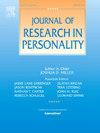连续时间内状态外向性与主观感知的情景社会性之间的动态关系
IF 2.6
2区 心理学
Q2 PSYCHOLOGY, SOCIAL
引用次数: 0
摘要
本研究利用连续时间动态模型研究了外向性与主观感知的情境社交性之间的动态相互作用。在为期一周的经验取样研究中,我们从大学生样本中收集了 4,694 份关于状态外向性和感知社会性的报告。结果表明,与感知社会性的变化相比,状态外向性的变化持续时间更长,恢复到基线的时间也更长。状态外向性的增加预示着感知社会性的随后增加,而感知社会性的增加预示着状态外向性的随后减少。交叉滞后效应在滞后 1.5 小时时达到最大值。社会性对状态外向性的负交叉滞后效应表明,为了平衡社会参与水平,外向行为的时间性减少是一种补偿机制。本文章由计算机程序翻译,如有差异,请以英文原文为准。
The dynamic relationship between state extraversion and the subjectively perceived situational sociality in continuous time
This study examined the dynamic interplay between extraversion and subjectively perceived sociality of situations using continuous-time dynamic modeling. In a week-long experience sampling study, we collected 4,694 reports of state extraversion and perceived sociality from a sample of university students. Results showed that changes in state extraversion lasted longer and took longer to return to baseline than changes in perceived sociality. Increases in state extraversion predicted subsequent increases in perceived sociality, whereas increases in perceived sociality predicted subsequent decreases in state extraversion. Cross-lagged effects reached their maximum at 1.5 h lag. The negative cross-lagged effect of sociality on state extraversion suggests a compensatory mechanism of temporal reduction of extraverted behavior in an effort to balance the level of social engagement.
求助全文
通过发布文献求助,成功后即可免费获取论文全文。
去求助
来源期刊

Journal of Research in Personality
PSYCHOLOGY, SOCIAL-
CiteScore
5.40
自引率
6.10%
发文量
102
审稿时长
67 days
期刊介绍:
Emphasizing experimental and descriptive research, the Journal of Research in Personality presents articles that examine important issues in the field of personality and in related fields basic to the understanding of personality. The subject matter includes treatments of genetic, physiological, motivational, learning, perceptual, cognitive, and social processes of both normal and abnormal kinds in human and animal subjects. Features: • Papers that present integrated sets of studies that address significant theoretical issues relating to personality. • Theoretical papers and critical reviews of current experimental and methodological interest. • Single, well-designed studies of an innovative nature. • Brief reports, including replication or null result studies of previously reported findings, or a well-designed studies addressing questions of limited scope.
 求助内容:
求助内容: 应助结果提醒方式:
应助结果提醒方式:


